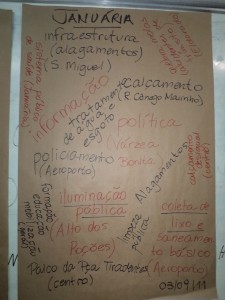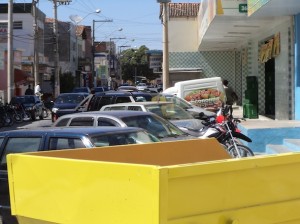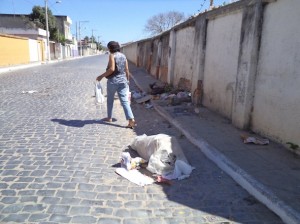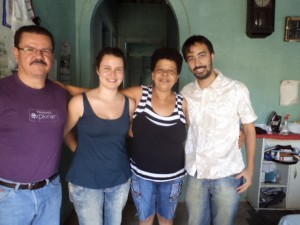Friends of Januária's course on citzen media started on September 3-4 with 14 participants excited to become reporters.
The first meeting started with a quick speech from Luiz Carlos Matos, the director of the school where the course will take place, to welcome the students. After him, Fábio Oliva and I presented ourselves and the course. The participants introduced themselves by telling their names, careers they have had or want to have once they graduate, neighborhoods they come from and something in this neighborhood they think could be different.

Panel with the things the participants would like to be different in their neighborhood.
Their answers opened a discussion on the importance of the citizen journalist to their communities. From that, we started to talk about what is citizen journalism and how it can provide more information to people.
We followed this subject with a quick activity in which the participants had to research on the internet what information they found about Januária. After this, the group started discussing the role of the mass communication companies and some questions arose:
- Who determines what is or what is not news?
In order to answer this, Fábio and I talked about some foundations of journalism, such as: its commitment to the public interest and truth; the selection of a subject and the structure of the news.
Finnaly, the participants talked about their experiences with internet and blogs and created their accounts on WordPress to start participating on the Friends of Januária's blog.
On this first day, all the participants received a kit with a folder, a notebook, a pen, and the first volume of the book we made for the project. The ones who were selected to participate in the course (besides them we invited three people to participate as visitors to the course) also received a book on how to fight corruption in small cities (that were donated to the project by Amigos de Ribeirão Bonito NGO) and a pen-drive.
On Saturday, the participants also decided what time the classes would be and what would be the tolerance for delays. They agreed with some basic rules for the course, too.
The local TV channel of Januária – TV Norte – registered the first activities of the course and interviewed Fábio, myself, and two of the young participants to know what were their expectations.
Getting started!
On Sunday at 8 a.m., the young journalists were all together again to start working!
The day started with a quick chat on what is journalistc research and how to do interviews. After that, the group was divided in three smaller ones to prepare a field activity in which they would search for news in Januária by interviewing people and taking pictures of what called their attention.
Bellow are some pictures took by them during this activitiy:



Each group received equipments to register the interviews and take pictures. For about an hour they walked around Januária's downtown looking for subjects to develop for their stories.
At the end, they met again to share with each other what they had found during their walk. We took notes on the subjects and each participant chose one to research and write about during the week.





